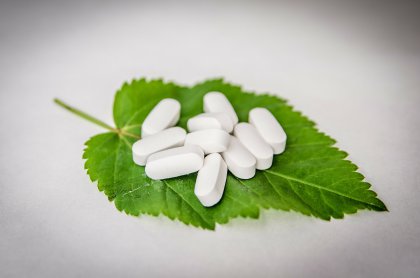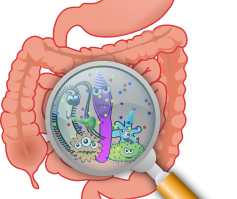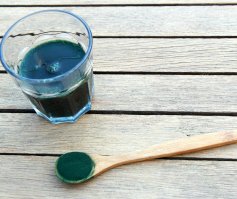 Ascorbic acid has a beneficial effect on the whole body. We are not able to produce it on our own, unlike most animals, so we have to diversify the menu so as to accumulate sufficient amounts of this vitamin.
Ascorbic acid has a beneficial effect on the whole body. We are not able to produce it on our own, unlike most animals, so we have to diversify the menu so as to accumulate sufficient amounts of this vitamin.
What is the risk of vitamin C deficiency?
 Insufficient amounts of ascorbic acid in the body can have serious consequences. The best-known ones are: Scurvy, spontaneous bleeding, damage to blood vessels, bleeding petechiae, poor wound healing and regeneration, gum loosening, changes in teeth, pain in joints and muscles, swelling of limbs, weakness, loss of appetite, reduced physical fitness, depression, osteoporosis, microcytic anaemia, hyperthyroidism, neurological disorders, secondary infections, gastric diseases, mucositis, prolonged colds and difficulties in treating infections. It is important not to neglect the constant addition of this vitamin to the diet, as even small deficiencies lead to the diseases mentioned above. Complete and prolonged lack of vitamin C can even lead to death.
Insufficient amounts of ascorbic acid in the body can have serious consequences. The best-known ones are: Scurvy, spontaneous bleeding, damage to blood vessels, bleeding petechiae, poor wound healing and regeneration, gum loosening, changes in teeth, pain in joints and muscles, swelling of limbs, weakness, loss of appetite, reduced physical fitness, depression, osteoporosis, microcytic anaemia, hyperthyroidism, neurological disorders, secondary infections, gastric diseases, mucositis, prolonged colds and difficulties in treating infections. It is important not to neglect the constant addition of this vitamin to the diet, as even small deficiencies lead to the diseases mentioned above. Complete and prolonged lack of vitamin C can even lead to death.
And what about excess ascorbic acid?
Vitamin C is not toxic to us, nor is it immunogenic. However, this does not mean that we can take any and unlimited doses of this substance. Excess vitamin C can cause stomach problems, nausea, diarrhoea, vomiting or skin rash. A drastic reduction in dose intake (after intensive intake) may reduce the body's immune system. Vitamin C intake is not recommended for people prone to kidney stone formation or suffering from haemochromatosis, thalassemia and syderoblastic anaemia.
Is there such a thing as a safe daily dose of vitamin C?
 The recommended dose of ascorbic acid for a healthy adult is about 500 mg per day. However, this is only a recommendation of far-reaching caution. Every person has his or her own individual standard that covers the daily requirements. Taking into account that we cannot produce this vitamin ourselves, we should take about 3 000 mg of ascorbic acid per day (if we are in good health) to 6 000 mg in disease conditions.
The recommended dose of ascorbic acid for a healthy adult is about 500 mg per day. However, this is only a recommendation of far-reaching caution. Every person has his or her own individual standard that covers the daily requirements. Taking into account that we cannot produce this vitamin ourselves, we should take about 3 000 mg of ascorbic acid per day (if we are in good health) to 6 000 mg in disease conditions.
It should be remembered that inflammatory and pathological conditions, as well as being in the environment that exposes us to toxic metals or contaminants, require adjusting the diet to the increased demand, i.e. increasing the doses of essential vitamins. The same applies to increased physical exercise and life under constant stress. More ascorbic acid should be taken by pregnant and nursing mothers, diabetics, people with hypertension, smokers and alcohol abusers.
Ascorbic acid easily destroyed
Vitamin C is extremely susceptible to elevated temperatures. When heated to 70oC it dies completely. It is also susceptible to light and direct contact with air. The absorption of vitamin C is also often limited due to gastrointestinal diseases or the use of certain drugs (including polopyrin and aspirin).
The way to limit vitamin losses is the appropriate treatment of vegetables and fruit. Boil them in a small amount of water, with vegetables or fruits put into the water only when it is already boiling. The best way to do this is to cook on a fairly low heat or by steaming. Infusions should be used for the preparation of subsequent meals, as they contain some of the beneficial ingredients from the processed raw materials.
 Vitamin C is poorly resistant to certain enzymes (oxidases). They are secreted by fruits and vegetables when they are cut.
Vitamin C is poorly resistant to certain enzymes (oxidases). They are secreted by fruits and vegetables when they are cut.
If you use L-ascorbic acid powder, make sure to store it in a dark container (e.g. in a brown glass bottle). Remember to close it tightly every time.
As you can see, vitamin C is a very delicate substance, which can be lost with unprecedented ease. This condition of ascorbic acid is the main reason why we should take large doses of the specificity. The chances of overdose are rather negligible.
What is the most beneficial form of vitamin C?
The most common form of vitamin C intake is, of course, the consumption of fruit and vegetables. However, the doses of acid in them are quite small, and a large part of them is lost during meal preparation.
Another form of supplying the body with this vitamin is the purchase of tablets or capsules. However, these, in addition to ascorbic acid, contain a number of fillers and preservatives. In addition, they are quite expensive preparations.

An alternative is to take vitamin C in its powdered form. One of the most important advantages is its low price. Powdered preparations are about ten times cheaper than vitamins in tablets or capsules. Another feature that cannot be overestimated is the left-handedness of the vitamin. This type, unlike the right-handed vitamin C, is very well absorbed by the body.
Ascorbic acid powder can be added to solid foods and drinks can be made from them. A drink prepared from a glass of water, 1 teaspoon of ascorbic acid and 1 teaspoon of sweetener in the form of xylitol or honey is extremely beneficial for health. If you cannot consume a lot of fruit and vegetables, it is worth to buy ascorbic acid powder. This will allow not only to supplement the level of the vitamin in the body, but also to















